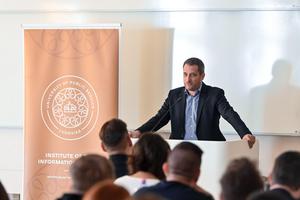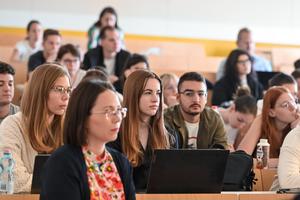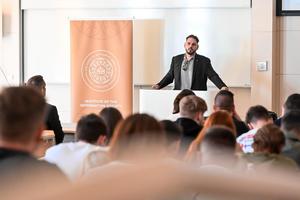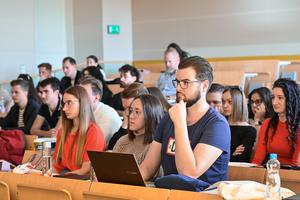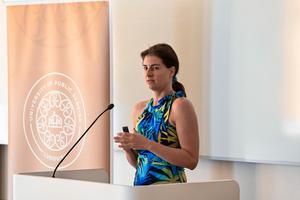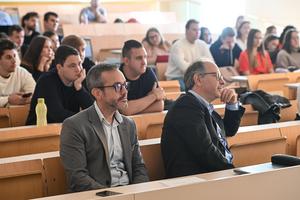Why is the regulation of artificial intelligence a nightmare? Can the public sector be left out of technological change? Can Europe lead the way in digital governance? International experts sought answers to these questions at the University.
The Institute of the Information Society (IIS) of the University of Public Service organised an international workshop entitled Artificial Intelligence (AI) for Government on 3 October at the Ludovika Main Building. Bernát Török, Head of IIS, said in his welcome speech that today's event is the first step in the implementation of a new university strategy. An important goal is that the students, who will be the public administrators of the future, will be able to use advanced technology, including AI, in the field of governance with responsibility. The university's research institutes have already made significant results available in this field. What is still missing is an education programme that deals specifically with AI. Following the international mini-conference, the Faculty of Public Governance and International Studies at UPS will soon test a one-week pilot project with researchers from the Eötvös József Research Centre, and finally, the courses on the topic will be offered in the next semester. Of course, it is very important to involve international experts in the implementation of this project.
The mini-lectures were opened by MI expert and consultant György Tilesch. He spoke about how surveys show that digital natives no longer want to deal with issues in person or by phone, preferring online solutions - even in personal areas such as banking. Yet they are much more data conscious than their parents' generation. These processes will also have a fundamental impact on public administration - concluded György Tilesch.
Olivia Erdelyi, the senior lecturer at University of Canterbury, School of Law and Visiting Professor at University of Bonn, reviewed the current regulatory environment for AI. She said that the point of all regulation is to influence behaviour in some way. Why is the regulation of AI a nightmare? - she asked. Because it is inconsistent, as there are countless decision-making organisations dealing with it at the same time. How should it be regulated? - continued Olivia Erdélyi. According to her, with adoption, simplifications and rationalization. Fortunately, most regulations today are based on principles developed by the Organisation for Economic Co-operation and Development (OECD). Three of the five principles - accuracy, transparency and non-discrimination - are even found in Chinese regulation.
Adrian Gonzalez Sanchez, Cloud, Data & AI Specialist at Microsoft, presented the application possibilities of generative AI in the public sector. He stressed that a revolutionary technology can be used for good, for the benefit of the community, but of course also for bad. A few years ago, AI-s were designed for a single, specific purpose, whereas the new models can be used for many purposes simultaneously. In his presentation, Adrian Gonzalez Sanchez also mentioned Spanish and Portuguese public service examples, such as the possibility of machine translation between Basque, Catalan, Galician and Spanish languages, and also that government chat software, which was taught with the most important Portuguese civic knowledge.
The mini-conference ended with a presentation by Gianluca Misuraca, Vice President on Technology Diplomacy and International Relations of Inspiring Futures and Executive Director of AI4GOV. He emphasised that the state bureaucracy cannot remain as conservative in its procedures and administrative habits as it has been so far. Although regulation in this area is primarily the competence of the Member States, the EU has started to develop a Community policy on digital governance to ensure consistency. Working together with its partners, the continent can even be a world pioneer in this difficult and challenging, yet inescapable area.
After the mini-lectures, Zsolt Ződi, Senior Research Fellow at IIS, led a roundtable discussion on the topic with the speakers, who also answered questions from the students.
You can read more about the lecture series on ludovika.hu (in Hungarian).
Text: Tibor Sarnyai
Photo: Szilágyi Dénes
